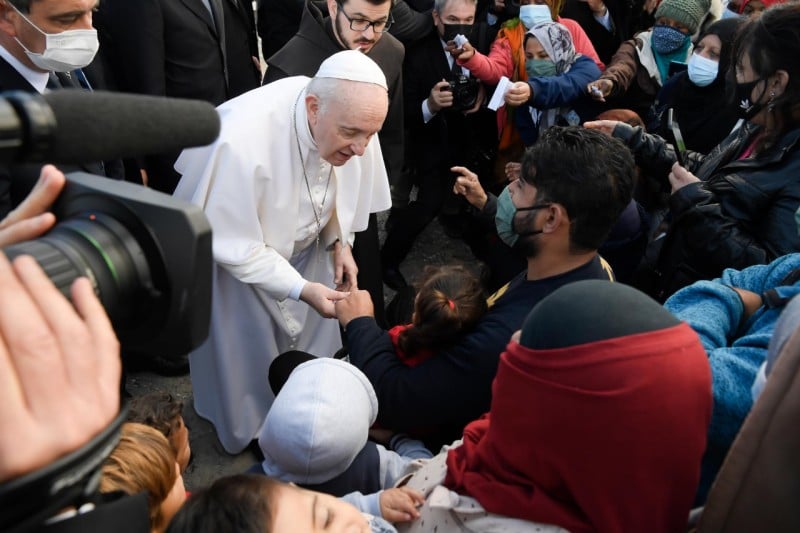Theology for Millennials: The Pope in Greece
‘Solatio Migrantium’

In his weekly article in “Theology for Millennials,” Father Mario Arroyo Martinez reflects on Pope Francis’ message in his recent trip to Greece, in which he has become solatio migrantium (consolation of migrants).
* * *
“Consolation of migrants” is one of the new litanies of the Holy Rosary proposed by Pope Francis. I think that, in addition to the Virgin, it can be said of Francis that he is really the “consolation of migrants; at least he has been so in his trip to Cyprus and Greece. In fact, his appeal has been moving not “to turn a blind eye” and look the other way but to face courageously the dramatic migratory issue. His closeness and preponderant interest in migrants has been heart-warming.
Francis’ message, both in the ecumenical ambit as well as the migratory, has two factors in common: in a negative key, to eliminate the barriers that separate us, as we are “brothers, friends, believers, neighbors,” not cold and impersonal statistical numbers. In the positive ambit, he invites to undertake “fraternity workshops,” namely, to discover in the other, whether Catholic or Orthodox, migrant or native, a being like oneself with a face, dreams, excitements, and hopes.
In Lesbos Francis made an appeal to heal the genuine causes of the migratory problem, namely, arms trafficking, war, injustice, and poverty. He puts his finger in the wound when he laments the individualism of the dominant culture in the West, which makes us close our eyes and heart to migrants.” I pray to God to wake us up from the forgetfulness of those suffering, may He shake us of the individualism that excludes, may He awaken deaf hearts to the needs of our neighbor. And I also beg man, every man: may we overcome the paralysis of fear, of indifference that kills, of the cynical indifference that with silk gloves condemns to death those that are on the margins. Let us confront from its root the dominant thought, which turns around one’s ‘I’, our personal and national egoisms, which become the measure and criterion of everything.”
In this connection, with dramatic comparison, Francis extends an invitation so that the Mediterranean, the “mare nostrum” doesn’t become the “mare mortuum,” that is, that “our sea” not become the ‘sea of the dead,” as is happening at present, as the Mediterranean, which for millennia has united different peoples and distant lands, is becoming a cold cemetery without gravestones.” In his mind, the Mediterranean must unite cultures again, not separate them.
Twice in his address, Francis quoted Nobel Prize winner, writer, and survivor of Nazi concentration camps, Elie Wiesel. The references are opportune, coming from someone who suffered in his own flesh what many refugees are now suffering: “I approach men, my brothers because I remember our common origin because I refuse to forget that their future is as important as mine.” The future of migrants is as important as ours, no more and no less. And it seems that we have left them aside. Francis laments that while the problem of the pandemic is already channeled and it seems that it moves around the problem of climate change, “everything seems terribly opaque in regard to migrations.” And we must not forget, again in Elie Wiesel’s words, that “when human lives are in danger when human dignity is in danger, national boundaries become irrelevant.”
In a word, Francis gives voice and visibility to migrants, so that they are not the great forgotten ones of the developed world. Not only with speeches but with gestures, as he says, looking at their eyes, their faces, listening to their tragic stories. Moreover, he finds in the migration problem an ecumenical bridge, where Christians of different traditions can meet with us and work and, why not?, fight for human dignity. He doesn’t stay in speeches, he goes beyond, to deeds, and he is taking a good group with him to Italy. Let’s hope that his dramatic appeal doesn’t fall on deaf ears and that the West takes charge of its historic humanitarian responsibility.
However, as Christians we cannot remain calm, waiting simply for governments to adjust their policies to the migratory drama. Instead, we should ask ourselves personally: “What am I doing for migrants?” or, failing that, “What am I doing for the needy?” Only thus will we take up Francis’ appeal and be able to be, like him, “solatio migrantium.”
Translation by Virginia M. Forrester
Related

The Five (5) “C’s” of PonCe
Exaudi Staff
04 April, 2025
4 min

The Lies of Love: Debunking Myths and Rediscovering the True Meaning of Love
José María Contreras
04 April, 2025
1 min

Family and Mental Health: Parents’ Secret Superpower for Raising Happy Children
Laetare
04 April, 2025
3 min

Cardinal Arizmendi: Let Money Not Rule Us
Felipe Arizmendi
03 April, 2025
4 min
 (EN)
(EN)
 (ES)
(ES)
 (IT)
(IT)

